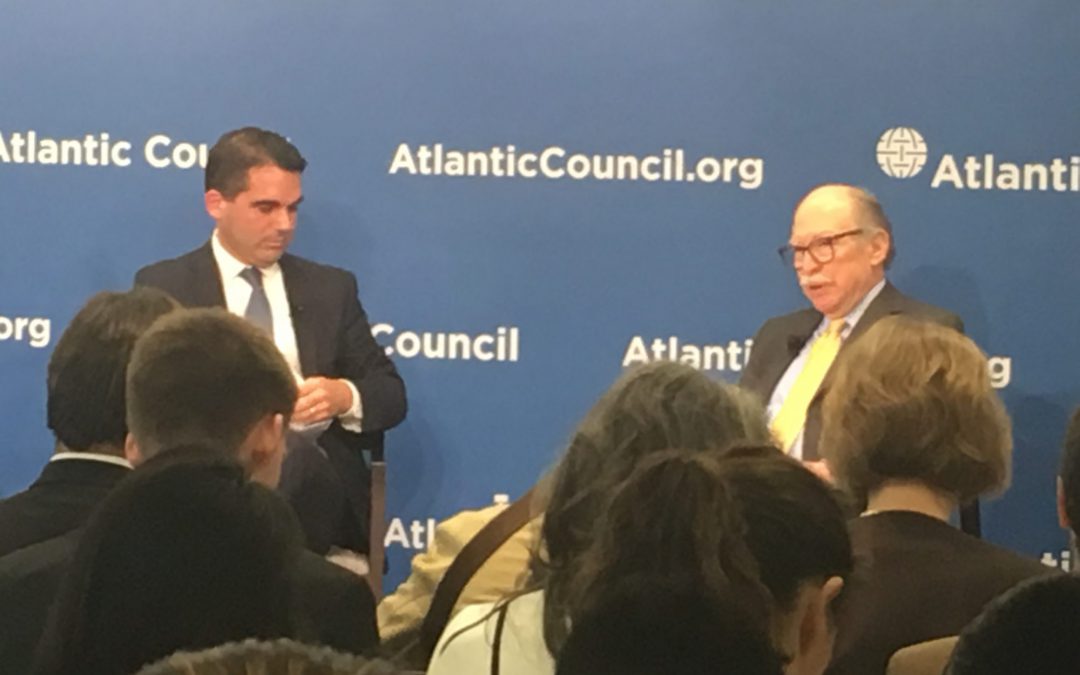WASHINGTON—The most pressing need in the Venezuela economic and political problems is providing humanitarian aid, Colombia’s ambassador to the U.S. said on Wednesday.
Hyperinflation that has escalated since the 2013 election of Venezuelan President Nicolas Maduro has caused a mass exodus of citizens. Colombia estimates that 600,000 Venezuelans have entered Colombia in the last 10 months, and many will continue on to other countries, Ambassador Camilo Reyes said. Former Bolivian President Jorge Quiroga added that the number of refugees fleeing Venezuela is the largest in the world, with more leaving the country than those leaving Syria.
“We’re short of time,” Reyes said. “The international community has to react immediately.”
Since Maduro was elected, the economy and quality of life has declined in Venezuela. The child malnutrition rate has reached 11.4 percent, and 85 percent of Venezuelans who seek medical care cannot get it or afford it, Reyes said. He added that the cost of food has increased 343 percent and inflation reached 189 percent.
“It is a country that has absolutely everything,” Quiroga said. “And in the midst of the best oil prices probably ever, to destroy the country to the degree that it has happened requires truly magic – it’s the Midas touch in reverse.”
The coalition of opposition parties in Venezuela, known as Democratic Unity, announced Tuesday that they will not participate in the presidential election set for April 22, which they say unfairly favors Maduro. Quiroga said that Maduro deliberately scheduled the election to coincide with presidential elections in Colombia, Brazil and Mexico.
On Feb. 13, the Lima Group, an international body formed in August by Latin American nations and Canada, declared its opposition to the election date set by the National Electoral Council of Venezuela, saying it comes too soon for the country to organize a properly free election. It also declared that Venezuela must free jailed members of Democratic Unity and relieve restrictions on the parties.
“If we’re picking and choosing who our opponents are, and not even saying, ‘You can participate,’ but putting you in jail, I think that’s a far cry from a free election,” said Gerardo de Icaza, acting secretary at the Organization of American States, an international organization chartered in 1948 to promote security and development in the Americas.
Mass protests erupted in the country last year after the Venezuelan Supreme Court ruled to take legislative power away from the congress, which the Democratic Unity parties controlled.
“I had said to many observers, outsiders, and many Venezuelans as well, ‘Be careful not to underestimate this government and its capacity to respond to the challenges to it,’” said Jennifer McCoy, professor of political science at Georgia State University. “But I also underestimated this government, not in its capacity to survive, but in how far it would be willing to go to bring the country down into misery,”
Despite the economic and diplomatic crises, Venezuelan support for Maduro is surprisingly high considering the economic and humanitarian hardships, according to the Atlantic Council. In a poll of Venezuelan citizens published on its website Wednesday, 31 percent of those surveyed gave Maduro a positive job approval rating. In the same poll, 44 percent answered negatively about the U.S.’s sanctions on Venezuelan public officials.
Quiroga said the international community must do everything possible to stop the humanitarian and political crisis in Venezuela. He outlined a plan including further sanctions and seizures of Venezuelan assets abroad, referrals to the International Criminal Court, diplomatic efforts and acceptance of immigrants by other countries.
The Dominican Republic hosted negotiations between the government and opposition parties in December and January, but no deal came out of those talks.
“The government and the opposition go to speak to each other, but they don’t really want to be there,” said Luis Enrique Lander, director of the Venezuelan Electoral Observatory.
Despite the failure of the recent negotiations, there is a possibility, if slim, that Maduro will use a victory in the April 22 elections to leverage a better deal with Democratic Unity, McCoy said.
“We have to continue looking at negotiations as a route forward,” McCoy added. “Internationally and nationally, looking for new possibilities for negotiations over policies, over the institutions, over future elections, or over some kind of a transitional government, which would be—in my mind—the best route forward, should continue to be on the table.”
Watch the full discussion here:

